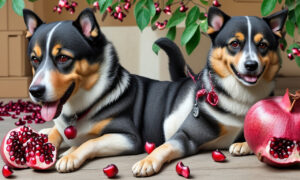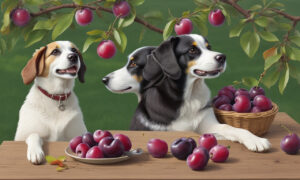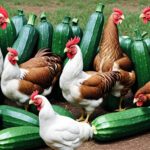As a backyard chicken keeper or poultry enthusiast, understanding what diet best suits your feathery friends is crucial to their health and happiness. Among the many treats and food options, apples emerge as a potential candidate to enrich your flock’s diet. In this comprehensive guide, we will delve into the surprising benefits of feeding apples to chickens and how this common fruit can contribute to a balanced and nutritious dietary regime for your flock.
The interest in organic, sustainable, and eco-friendly poultry farming is surging, and with that comes the question: Can chickens eat apples? The answer is yes, and the benefits are more far-reaching than you might expect. However, it’s essential to understand the nuances of how to properly incorporate apples into your chickens’ diet to maximize the advantages and minimize any potential risks.
Nutritional Value of Apples for Chickens
Apples aren’t just a tasty treat for people; they’re nutritionally beneficial for chickens as well. Packed with essential vitamins and minerals, they can play a significant role in the overall health and well-being of your flock. Let’s break down the nutritional components of this delicious fruit:
Vitamins and Minerals in Apples
Apples contain several vitamins and minerals that are beneficial for chickens, such as:
- Vitamin C: Supports the immune system and aids in stress reduction.
- Vitamin A: Crucial for vision health and egg production.
- Calcium: Essential for bone health and strong eggshells.
- Phosphorus: Works in tandem with calcium to promote bone health.
Antioxidants
Apples are rich in antioxidants, which help protect chickens from oxidative stress and may improve their ability to fight off diseases.
Dietary Fiber
With a decent amount of dietary fiber, apples can aid in digestion and help maintain a healthy gut in chickens.
The Importance of Moderation
While apples offer numerous health benefits, they should be fed to chickens in moderation. Apples are high in sugar, which, in excess, could lead to obesity—a common issue in domesticated flocks. The recommended serving size varies, but generally, a slice or two per chicken can be considered safe.
The Right Way to Serve Apples to Chickens
Preparing Apples for Your Flock
Before offering apples to your chickens, there are a few steps you should follow for the safety and health of your birds:
- Wash thoroughly: Ensure to clean the apples to remove pesticides or chemicals.
- Remove the seeds and core: Apple seeds contain trace amounts of cyanide, which can be harmful.
- Cut into manageable pieces: Chopping apples into small pieces can help prevent choking.
Offering Apple Varieties
Different varieties of apples, from Granny Smith to Red Delicious, can be served to chickens. Each type brings a unique flavor and nutrient profile, so feel free to offer a variety.
The Safety and Risks: Understanding the Limitations
Potential Hazards of Feeding Apples to Chickens
- Cyanide in seeds: As mentioned earlier, apple seeds contain cyanide.
- Choking hazard: Large pieces of apple can be difficult for chickens to swallow.
- Pesticides: Non-organic apples may have pesticide residues, so choosing organic is recommended when possible.
Avoiding Spoiled Apples
Never feed your flock spoiled or fermented apples, as this can lead to health issues and even alcohol poisoning due to fermentation.
The Surprising Benefits: Enhancing Your Flock’s Diet
Offering apples to your chickens is more than just a treat—it’s a tool to promote their health. Here are some of the standout benefits:
Improved Digestive Health
The dietary fiber in apples can aid in your chickens’ digestive processes, leading to better nutrient absorption and overall gut health.
Boost to the Immune System
Vitamin C and antioxidants in apples help bolster your flock’s immune defense, guarding against illness and stress.
Antioxidants for Disease Prevention
The antioxidants in apples can help ward off diseases by neutralizing free radicals that might otherwise harm your chickens’ cells.
Integrating Apples into Your Flock’s Diet Plan
Balance is Key
While apples are beneficial, they should complement a well-rounded diet, one that includes grains, vegetables, and appropriate commercial feeds.
Treats as a Part of a Healthy Diet
Treats, including apples, should make up no more than 10% of your chickens’ daily intake. The primary focus should remain on nutritionally complete poultry feed.
Apples and Egg Production: A Hidden Connection?
The Impact of Vitamins on Egg Laying
Apples’ nutrients—particularly vitamin A—can potentially enhance egg production and quality. Though more research might be needed to solidify this link, the existing nutritional content certainly suggests a positive impact.
Aiding in Strong Eggshells
Calcium in apples is a plus for laying hens as it’s essential for strong eggshell formation.
FAQ About Chickens and Apples
To ensure we cover all bases, let’s tackle some common questions regarding chickens and apples:
Can Chickens Eat Apple Skin?
Yes, apple skin is not only safe for chickens but also contains additional fiber and nutrients. Just be sure it’s clean and free from pesticides.
How Often Can Chickens Eat Apples?
Chickens can enjoy apples a few times a week as part of a balanced diet.
Are Cooked Apples Good for Chickens?
Cooked apples are fine, but raw, crunchy apples provide the most nutritional benefits and enjoyment to your flock.
Conclusion: Apple-Feeding Best Practices for Optimal Health
Incorporating apples into your chickens’ diet can offer a wealth of benefits if done correctly. Remember the points we’ve discussed:
- Serve apples in moderation.
- Remove the seeds and core.
- Ensure apples are clean and cut into small pieces.
- Balance treats with a nutritious, complete diet.
By embracing these best practices, you’ll be providing your flock with a delightful treat that simultaneously enhances their health and vitality. So next time you’re munching on a crisp apple, don’t forget to save a slice for your feathered friends—it’ll be a peck in the right direction for their well-being.






